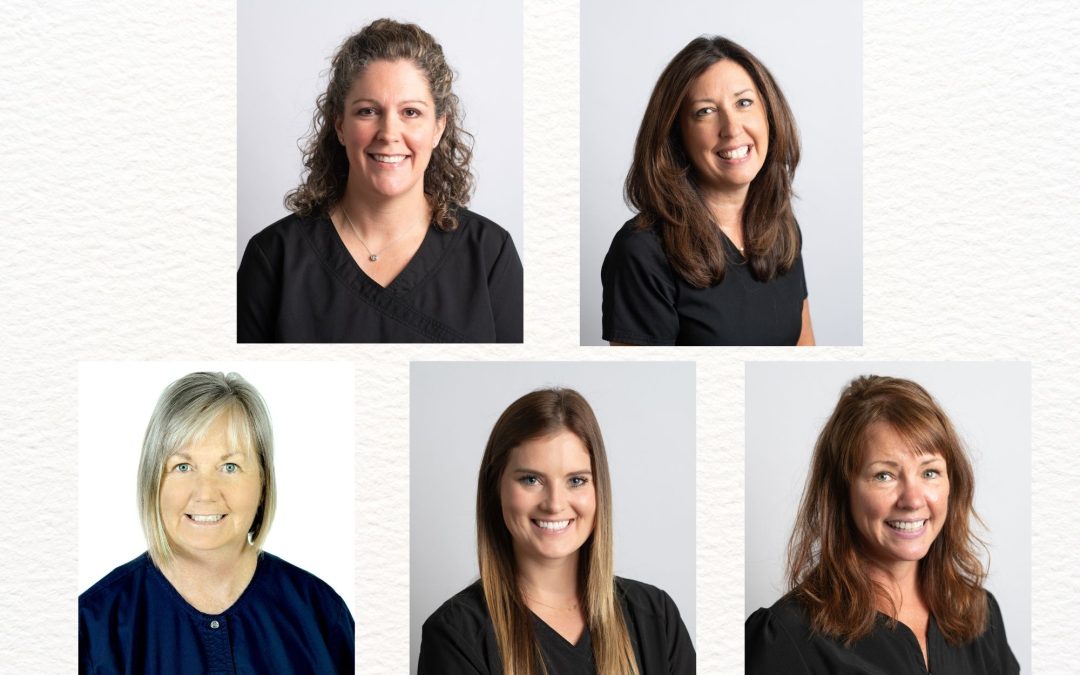
Oct 10, 2022
It’s National Dental Hygiene Month!
Get out your toothbrush and floss..it’s National Dental Hygiene Month! This month-long campaign is focused on raising public awareness about oral health and hygiene as well as a reminder to practice daily habits that promote healthy teeth and gums. At FDA, we have an amazing team of hygienists who are wonderful ambassadors of excellent oral health care: Alex, Diann, Erin, Jean, Kelly and Lydianne. They are always putting their patients’ comfort first and they love educating others about setting up a personalized and effective oral health routine. We heart our hygienists!! In honor of our rock star hygienists and National Dental Hygiene Month, here are our top three – hygienist-approved – tips for daily oral health care!
Brush!
It’s not rocket science, just good old-fashioned oral hygiene. Get yourself an ADA-approved toothbrush with soft bristles and treat your teeth and gums to a gentle massage twice a day for two minutes. Bonus points if you upgrade to an electric toothbrush – they are more effective at removing plaque. Think of your daily brushing routine as an important part of your self-care routine. If you’d like a demonstration of the best way to brush, ask your hygienist at your next appointment. They are experts!
Floss!
We know this can be a tough one to incorporate into your daily routine, but flossing once a day is a crucial component of oral health. Flossing gets into all the nooks and crannies where the brush doesn’t reach and cavity-causing bacteria can hide. If you find flossing difficult, try a water flosser or use a product like ‘Go-Betweens’ or ‘Plackers.’ Find an option that works for you and stick with it! Your gums and teeth will be grateful!
Eat well!
Oral health and hygiene are one part of a self-care routine for your overall wellness. Eating a healthy diet full of vitamins and minerals is not only good for your body, but it’s good for your teeth and gums, too! There are lots of ways to pack your plate with mouth-friendly food: load up on crunchy veggies and leafy greens, grab a hunk of cheese for extra calcium, sip on green tea for extra antioxidants. Need more ideas? Chat with Alex, Diann, Erin, Jean, Kelly, or Lydianne at your next appointment…think of them as your partners in oral health and hygiene!
While good oral hygiene is important every month, we hope you help us spread the word about the easy ways you can incorporate mouth-friendly daily habits into your self-care routine this October. Also – give some gratitude to your hygienist at your next appointment. They are truly compassionate professionals and work hard every day to make sure our family of patients feel cared for and comfortable. If you have questions or want to go over your healthcare routine, give us a call: 207.781.5900. We are here to be your partner in excellent oral health care!
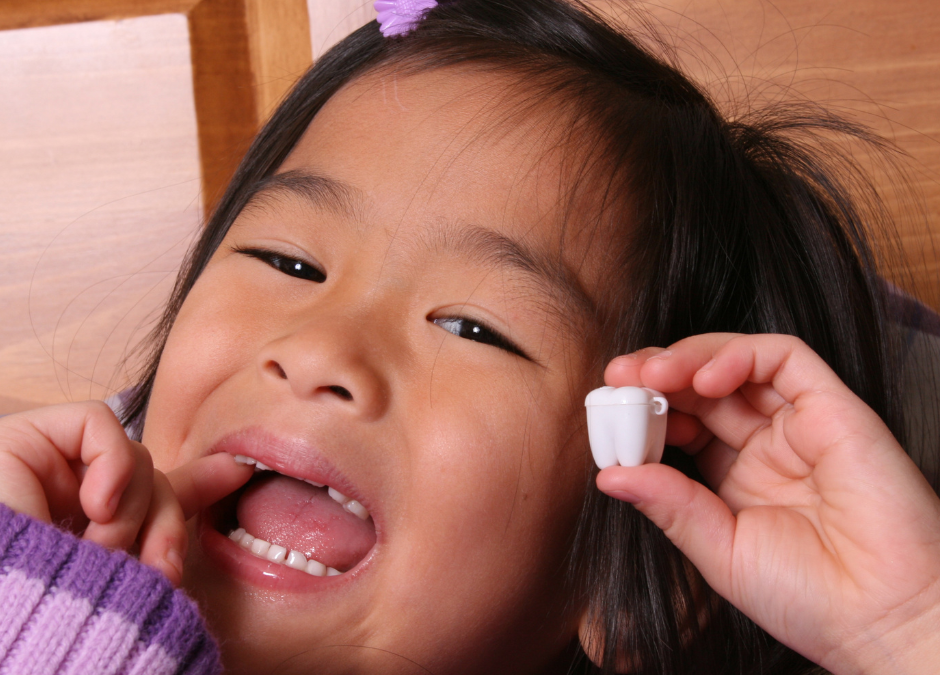
Sep 21, 2022
At Falmouth Dental Arts, we believe that good oral health habits start early. We love helping children learn to take care of their teeth and it’s always an exciting time when a little one has his or her first loose tooth! Your child may have questions about having a wiggly tooth and may be wondering what to do if he or she loses it at school. Here are six tips that will make having a loose tooth a fun and stress-free experience!
1) Be Prepared
Most children have their first loose tooth between the ages of 6-7, although some may lose a tooth earlier and some later. It is very likely that once your child reaches kindergarten age, he or she will find themselves heading to school with a loose tooth. Prepare your child for this possibility by telling them that it’s okay – this is a completely normal and exciting milestone! This handy tooth chart, created by the American Dental Association, will help give you (and your child) an idea of what to expect and when!
2) Tell Your Child’s School
It’s a good idea to let your child’s teacher know if your child has an extremely wiggly tooth, especially if he or she is feeling nervous about it. Elementary-level teachers have lots of experience with their students losing teeth at school and can refer your child to the nurse to rinse their mouth or get cleaned up if the tooth does come out. Let your child know he or she can bring the tooth home in a plastic baggie or wrapped in a tissue to put under their pillow for the Tooth Fairy’s visit later on.
3) To Pull or Not to Pull – Let Your Child Take the Lead
You may be wondering if you should pull out your child’s loose tooth at home or let it fall out on its own. The answer is…let your child decide! If the tooth is really wiggly or is causing them discomfort, your child may just want to get it over with and ask for your help. If they do, place a tissue over the tooth and gently squeeze. If it’s ready, it should just come right out. Tell him or her how brave they were and how the Tooth Fairy recognizes extra courage!
4) Keep Calm and Continue Your Child’s Dental Routine
Tell your child that they should not touch or prod the space where their tooth used to be. The area should heal up quickly, although he or she may want to eat on the other side of their mouth if the gum area is still feeling sensitive. Your child should continue their regular dental routine – brushing twice a day and flossing daily – as usual and should rinse or brush gently around the area to make sure it stays clean and no food gets stuck.
5) Bring on the Tooth Fairy!
If you’re open to a little make-believe, a visit from the Tooth Fairy can become a really special tradition for your child. Check out our past post about fun Tooth Fairy traditions from around the world. Encourage your child to write a note to the tooth fairy, letting her know that he or she lost her tooth at school or that they asked you to pull it out at home. Have them leave the note under their pillow, or on their door so the tooth fairy doesn’t forget to visit (wink, wink). Consult other parent friends to determine “the going rate” for a gift from the Tooth Fairy, or set your own rate and explain that every child has his or her own special fairy that’s just right for them.
6) Get in Touch with Us if You Have Questions!
If your child seems to be very early or late in losing a baby tooth or loses a tooth due to injury, do not hesitate to give us a call at 207.781.5900. Our team of compassionate dental professionals would be happy to answer any questions you may have or can schedule an exam for your child with Dr. Brunacini or Dr. Karagiorgos. While your child is here for his or her appointment, we can also go over their dental routine to make sure they are taking care of their baby teeth as well as the new permanent teeth growing in!
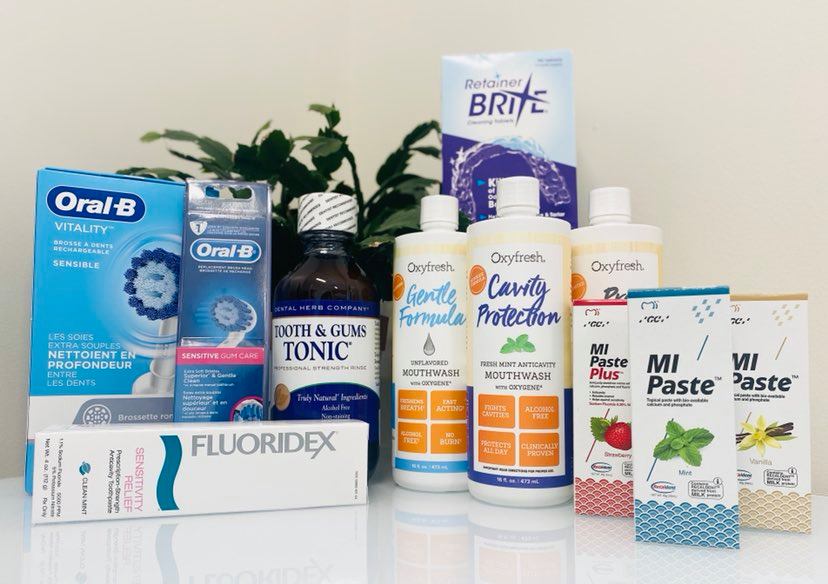
Sep 20, 2022
Dental Hygiene Products We Recommend to Our Patients
Here at Falmouth Dental Arts, we endorse and recommend a variety of professional products to our patients. “Based on our team’s many years of combined experience, we have developed a list of products we think are particularly effective at supporting our patients’ home dental hygiene routines and keeping their teeth and gums healthy in-between visits,” says Ashley Landry, Clinical Director, and Dental Hygienist at FDA. Here’s more information about the products we think can give an extra oomph to your oral health care!
Mouth Rinse
Oxyfresh is a gentle but powerful mouthwash that uses natural ingredients like mint to help keep your breath fresh all day. Oxyfresh is alcohol and dye-free, naturally sweetened, and made in the USA. It’s specially blended with Zinc and Oxygen®, a proprietary bad-breath fighter, to promote oral health while neutralizing bad breath. We offer Oxyfresh in 3 different versions: a gentle mint-flavored Pro-Formula, non-flavored Gentle Formula, and Cavity Protect with the added benefit of fluoride.
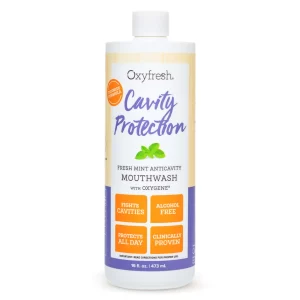
Tooth & Gums Tonic is a natural, professional-strength mouth rinse formulated to reduce oral bacteria and inflammation with pure essential oils. This alcohol-free rinse is blended with essential oils and herbs such as Echinacea and Gotu Kola, known for their anti-inflammatory and breath-freshening properties – a great alternative to other prescription mouth rinses!
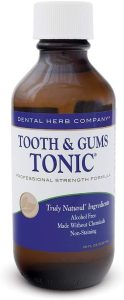
Toothpaste
MI Paste and MI Paste Plus is uniquely-formulated toothpaste fortified with calcium, fluoride, and phosphate that helps replace beneficial minerals lost from the tooth’s structure. MI Paste helps to prevent decay, sensitivity, tooth erosion, and tooth wear while restoring enamel gloss. A great product for patients who experience dry mouth and hypersensitivity as well as for those receiving orthodontic treatment.
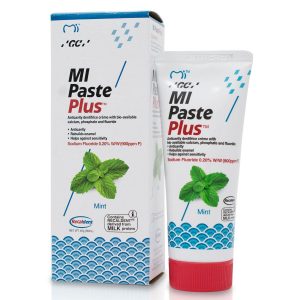
Fluoridex is prescription-strength fluoride toothpaste designed for use at home. It helps to prevent tooth decay and reduce harmful bacteria. Fluoridex is a great addition to your home care routine that helps to strengthen the enamel, reduce tooth sensitivity, and protect your teeth. Used over time, Fluoridex can help strengthen tooth enamel and prevent cavities.
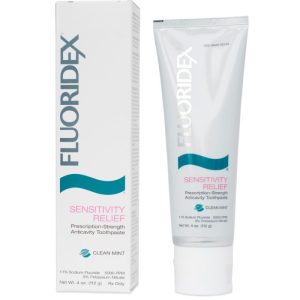
Retainer Cleaner
Retainer Brite is a great way to keep your night guard or other removable appliance, such as Invisalign, clean and ready for daily use. The specially-formulated tablets help protect and preserve appliances while also gently cleaning them. They are simple to use and kill up to 99% of common odor-causing bacteria. They also work to eliminate the cloudy film and plaque buildup when used to clean your retainer every day.
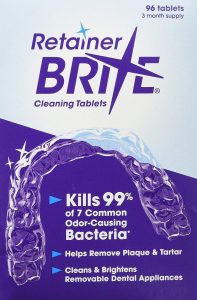
Toothbrushes
Oral B Electric Toothbrushes are designed to give you the best possible tooth cleaning at home. Electric toothbrushes effectively remove plaque while being gentle on your gums. We recommend these electric toothbrushes to our patients for a successful home care routine as they efficiently reduce plaque and prevent gingivitis.
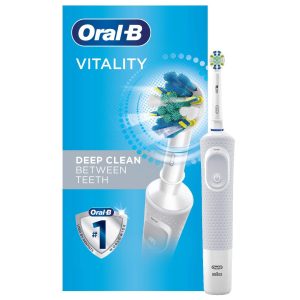
If you are interested in trying one of the products listed above or are wondering which one might be right for you, our team of dental professionals is happy to make a recommendation. Ask us any questions you might have at your next appointment or give us a call at 207.781.5900!

Aug 12, 2022
At Falmouth Dental Arts, we’re all about our patients’ comfort! From start to finish, we want your entire experience to feel comfortable both physically and emotionally. Many patients feel anxiety around their oral health care appointments and we’re here to help. That’s why we approach dentistry with the whole body in mind, so we can better educate and communicate with our patients. Our goal is to create a partnership where you feel heard and respected. So let us help you relax and receive the best oral health care possible! Here are some of the ways we support our patients to find their inner Zen!
It all starts when you walk through the door. From our friendly front desk staff to our comfortable waiting area, we have created an environment that is meant to help soothe and relax you. We want to make each visit to the dentist as calming and stress-free as possible. We will always explain what to expect during your visit and our up-to-date anesthesia techniques make dental treatments a breeze.
If you are feeling nervous before or during your visit, we recommend that you try relaxation techniques, such as breathing and visualization. Taking slow, deep breaths and visualizing yourself in a peaceful, relaxing place is helpful for many people. Also, many patients like to have something to distract them and bring their earbuds to listen to music or a podcast during their appointment. Breathe in, breathe out…and find what works best for you!
If you experience anxiety during dental procedures, please discuss this with Dr. Brunacini or Dr. Karagiorgos, or another member of the FDA team as we have options to help you stay calm, cool, and collected. We offer nitrous oxide as well as anxiolysis sedation for our patients who need a little more help with staying comfortable and relaxed before and during their visits. Patients that have mild to moderate dental anxiety are good candidates for sedation, as well as patients that have a harder time getting numb.
So…relax! We’re here to help make your oral health care experience supportive, soothing, and comfortable! If you’re interested in learning more about sedation options or other ways for you to prepare for your next dental visit, give us a call at 207.781.5900 to schedule your baseline appointment.

Aug 11, 2022
Summer is a time to kick back, relax, and enjoy, but it’s still important to keep up with your oral health routine, even during the hottest days. Here are some tips to keep your pearly whites in tiptop shape during the dog days of summer and beyond.
1) Skip the Sugary Drinks
Instead of reaching for a sugary drink to quench your thirst, stick to beverages with no added sugar whenever possible. Skip the soda (not only do sodas have high sugar content, but the carbonation is also acidic and can harm tooth enamel). While sports drinks contain electrolytes, which are helpful in preventing dehydration, did you know that they also contain more than 30 grams of sugar and 250 grams of sodium? Stick to sugar-free versions instead.
2) Drink More Water
A good rule of thumb is to drink half your body weight in ounces of water. Some ideas to help you reach your water goal are to find an insulated, refillable water bottle you like, infuse your water with lemon or use flavor drops for a little pizazz. Drinking is not only good for your metabolism, it’s also good for your teeth!
3) Prevent Tooth Discoloration
Many of us love an iced coffee or tea on a hot day but if you drink them frequently, there is a chance this can lead to tooth discoloration. Other summer favorites like cola, red wine, grape juice, cranberry juice, and blueberries are also common causes of tooth staining.
There are a few things you can do to keep your smile whiter, however, such as adding milk to your iced coffees and drinking out of a straw. It is also helpful to drink a glass of water after consuming one of these foods or beverages or rinse with a mouthwash. If you are concerned about the stains you already have, we’d be happy to discuss your options for teeth whitening. We offer both in-office whitening and at-home options and Dr. Brunacini or Dr. Karagiorgos would be happy to recommend an option that is best for you.
4) Don’t Bite the Ice
We know how satisfying it is to chew the ice left in the bottom of your drink, but this is a common cause of tooth breakage. If you are looking for a safer alternative, try adding crushed ice to your drinks instead. Try mixing ice with your beverage of choice or some fresh fruit in a blender and until smooth.
5) Protect your lips with SPF Lip Balm
Any time you are outside enjoying the sun, remember to wear sunscreen on any exposed areas, including your lips! Choose a lip balm with an SPF of at least 30, and reapply often, especially after swimming or drinking.
6) Keep Your Regular Hygiene Appointments
We know summer gets busy, but the best way to ensure good oral health in any season is to keep your regular hygiene appointments. If you have any questions about your oral health or need to schedule an appointment, call us today at 207.781.5900.











